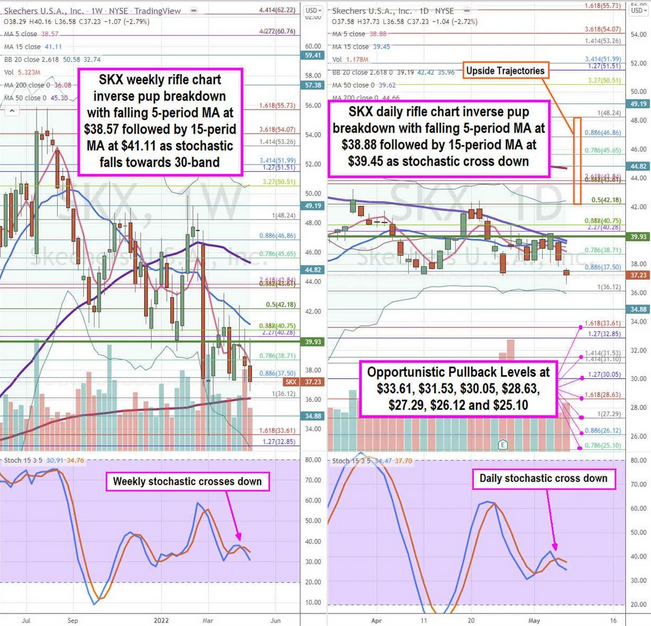Consumer footwear and athleisure brand Skechers USA (NYSE:SKX)stock has fallen (-16%) for 2022, faring slightly better than the benchmark indices. The third-largest footwear maker hit all-time high quarterly revenues in its fiscal Q1 2022 results.
It has grown its direct-to-consumer (DTC) sales to 29% of total revenues, while international sales still make up the bulk 60% of revenues. The Company was able to navigate the global supply chain disruption successfully. Despite COVID-19 restrictions being notably persistent in China, the Company still expects to hit $10 billion in sales by 2026.
The Company invested significantly in growing its workforce and managing logistics challenges to deliver its inventory to wholesalers to meet strong consumer demand. This enabled the Company to improve its average price per unit by 50%.
The company expands its customer base by growing its roster of well-known talent and athletes. Shares trade at 12.8X forward earnings. Prudent investors seeking exposure in a footwear company still firing on all cylinders can watch for opportunistic pullbacks in shares of Skechers.
Q1 2022 Earnings Release
On April 26, 2021, Skechers released its fiscal first-quarter 2022 results for March 2022. The Company reported an adjusted earnings-per-share (EPS) profit of $0.80 excluding non-recurring items versus consensus analyst estimates for a profit of $0.73, beating estimates by $0.07.
Revenues grew 29.3% year-over-year (YOY) to $1.85 billion, beating analyst estimates $1.69 billion. Skechers CEO Robert Greenburg commented,
“As we mark our third decade in business, we couldn’t be more excited about our future. In the first quarter, we achieved a new quarterly sales record, delivered the most innovative, stylish, and comfortable product yet, and supported it with impactful marketing.”
Raised Estimates
Skechers issued upside guidance for Q2, with EPS coming in between $0.40 to $0.50 versus $0.30 consensus analyst estimates. Revenues for Q2 are expected to come in between $1.45 billion to $1.55 billion versus $1.22 billion analyst estimates.
The Company also raised its full-year 2021 EPS to come in between $1.80 to $2.00 versus $1.92 analyst estimates and full-year revenues between $5.8 billion to $5.9 billion versus $5.54 billion consensus analyst estimates.
Conference Call Takeaways
Skechers U.S.A. COO, David Weinberg presided over the call. He noted the $1.8 billion all-time high quarterly sales record achieved in its fiscal Q1 2022. This was driven by 33% increase in Wholesale and 16% increase DTC segments. The Americas saw a 31% in top line growth, but EMEA saw a 49% increase in sales. APAC had 4% growth led by China.
APAC markets saw several geographies increase COVID-related restrictions, especially China. However, the Company still expects that market to grow to $10 billion in sales by 2026. The wholesale business growth was led by the Americas and EMEA, which both grew over 40% in the quarter.
The DTC segment saw 150% increase in the EMEA, due to last years operating restrictions which were alleviated this year. The Company saw double-digit growth in both physical and e-commerce due to a 50% improvement in average price per unit from the increased demand.
The Company also opened 31 new company-owned stores in the quarter globally. He concluded by noting many of its new roster of talent to expand its customer base,
“We also introduced two new ambassadors Willie Nelson and Martha Stewart and launch campaigns with Chris Carter, Rusty Wallace, and Amanda Kloots. This quarter, we announced the global agreement with Pro Golfer Matt Fitzpatrick and pro Pickleball players Tyson McGuffin and Catherine Parenteau who are playing in Skechers pickleball footwear.”

SKX Opportunistic Pullback Levels
Using the rifle charts on the weekly and daily time frames provides a precision view of the landscape for SKX stock. The weekly rifle chart has put in a near-term bottom around the $33.61 Fibonacci (fib) level before staging a coil back up into earnings. The weekly formed an inverse pup breakdown with the falling 5-period moving average (MA) at $38.57 followed by the 15-period MA at $41.11.
The weekly 50-period MA resistance is at $45.30. The weekly 200period MA support sits at $36.12 and lower Bollinger Bands (BBs) sit at $32.74. The weekly market structure low (MSL) buy triggers on a breakout above $39.93. The daily rifle chart breakdown has a falling 5-period MA at $38.88 followed by the 15-period MA at $39.45.
The daily 50-period MA sits at $39.62 as the BBs start to expand with the daily lower BBs falling at $35.96. The daily stochastic crossed back down as the bounce momentum got stifled and reverses. Prudent investors can watch for opportunistic pullback levels at the $33.61 fib, $31.53 fib, $30.05 fib, $28.63 fib, $27.29 fib, $26.12 fib, and the $25.10 fib level. Upside trajectories range from the $42.18 fib level up towards the $48.24 fib level.
